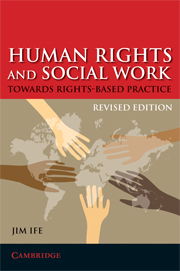Book contents
- Frontmatter
- Contents
- About the author
- Acknowledgments
- Introduction
- 1 Human Rights in a Globalised World
- 2 Human Rights: Beyond Traditional Formulations
- 3 Public and Private Human Rights
- 4 Culture and Human Rights
- 5 Human Rights and Human Needs
- 6 Human Rights and Obligations
- 7 Ethics and Human Rights
- 8 Participation in the Human Rights Discourse
- 9 Constructing Human Rights for Social Work Practice
- 10 Achieving Human Rights through Social Work Practice
- 11 Respecting Human Rights in Social Work Practice
- 12 Conclusion: Prospects for Human Rights Practice
- Appendix I The Universal Declaration of Human Rights
- Appendix II Other Human Rights Declarations, Treaties and Conventions
- References
- Index
12 - Conclusion: Prospects for Human Rights Practice
- Frontmatter
- Contents
- About the author
- Acknowledgments
- Introduction
- 1 Human Rights in a Globalised World
- 2 Human Rights: Beyond Traditional Formulations
- 3 Public and Private Human Rights
- 4 Culture and Human Rights
- 5 Human Rights and Human Needs
- 6 Human Rights and Obligations
- 7 Ethics and Human Rights
- 8 Participation in the Human Rights Discourse
- 9 Constructing Human Rights for Social Work Practice
- 10 Achieving Human Rights through Social Work Practice
- 11 Respecting Human Rights in Social Work Practice
- 12 Conclusion: Prospects for Human Rights Practice
- Appendix I The Universal Declaration of Human Rights
- Appendix II Other Human Rights Declarations, Treaties and Conventions
- References
- Index
Summary
There are two views one can take on the timeliness of the idea of human rights. One is that it is an idea whose time has come. This view sees human rights as being a necessary counter to economic globalisation, and asserts that in the newly globalised world ideas of global citizenship, based on ideals of human rights, are important in the same way that ideas of national citizenship rights became important with the emergence of the nation state. It suggests that the apparently increasing interest in a human rights discourse is a source of hope for a future based on collective understandings of shared human values rather than individual greed and consumption. Human rights can be the basis for a future of humanity that until now has been an apparently impossible dream.
The other view of human rights is that it is an idea whose time has passed. This view sees human rights as a leftover remnant from the disappearing world of modernist certainty and western imperialism. In the newly emerging postmodern world of relativism, multiple voices, fragmented realities and the ‘death of the meta-narrative’, there is no room for, and no point in, a universal discourse such as human rights. The idea of human rights is so tied up with the modernist project, and so western in its construction, that to persist with it is both an irrelevance and a disservice to humanity rather than a positive contribution to the future.
- Type
- Chapter
- Information
- Human Rights and Social WorkTowards Rights-Based Practice, pp. 224 - 228Publisher: Cambridge University PressPrint publication year: 2008



